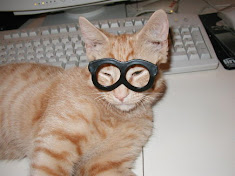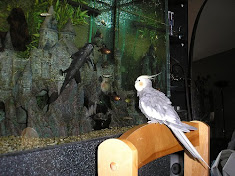Dental health is critical to your canine. It is just as important as a proper diet, plenty of exercise, and routine veterinary examinations. Yet few owners give it the level of priority it deserves. Below, we'll describe some of the problems that can occur if you neglect your dog's teeth. We'll also explain how your pet's veterinarian can help, and offer a few tips for providing dental care at home.
 |
| Massive Tartar Buildup and Decay of a Dog's Teeth |
Your dog is unlikely to ever suffer from a cavity. They are rare in canines. Instead, he is susceptible to gum disease, which begins as bacteria. While he eats meals, small fragments of food can become stuck between his teeth and gums. These fragments attract bacteria, which allows plaque to form. Even though plaque can be removed easily at home, most owners neglect to do so.
If plaque is allowed to persist, it will eventually turn into tartar. This process occurs due to elements contained in your canine's saliva; it usually takes several days. Unlike plaque, tartar cannot be easily removed without special tools (i.e. scalers) or a veterinarian's help.
Tartar causes inflammation. If you lift your pet's lips, you'll notice his gums are red and irritated. This is called gingivitis. The tartar should be removed as quickly as possible before the condition evolves into periodontal disease.
Periodontal Disease
Tartar that is left on your dog's teeth will begin to create gaps along the gum line. This allows bacteria to colonize the gaps, causing severe pain. This is called periodontal disease; damage to the teeth becomes permanent. Even worse, periodontitis can cause abscesses and infection. If bacteria gains access to your canine's bloodstream, it can affect the function of his liver, kidneys, and other organs.
Oral Cleanings From A Veterinarian
Your canine's veterinarian will perform a thorough examination that reveals any signs of tartar, gingivitis, or periodontal disease. He will examine your pet's mouth and face, looking for indications of swelling; he'll also inspect your dog's teeth, gums, and tongue to note any signs of infection; and he'll observe your canine's bite to make sure it is normal.
Once a thorough exam has been completed, the veterinarian will perform a professional cleaning. He'll remove any plaque or tartar present on your canine's teeth. Then, he'll inspect and polish each tooth to eliminate blemishes.
Tips For Preventing Dental Problems At Home
The most important thing you can do to help preserve your canine's dental health is to brush his teeth once per day. Doing so removes food fragments that might otherwise become stuck, and attract bacteria. It thus prevents plaque from gaining a foothold, and stops tartar from forming in the first place. Use a toothpaste that is designed specifically for dogs.
Also, provide your dog with dry treats and foods that minimize the likelihood of plaque. Canned foods are more likely to lead to plaque than dry foods.
You can also purchase toys that promote good dental health. These toys can be chewed, or gnawed, by your dog, which helps to dislodge food particles that have become stuck between his teeth and gum line. Take care to not give him toys that will cause his teeth to wear down, however.
Your dog depends largely on you to help him avoid gum disease and related dental problems. Brush his teeth regularly, and have his veterinarian examine and clean them once a year.
About the Author
Written by Lawrence J. Reaves
Find the best dog treats from Bestbullysticks.com and check out the famous Dog Chews
Source: www.isnare.com
Permanent Link: http://www.isnare.com/?aid=596341&ca=Pets



0 comments:
Post a Comment